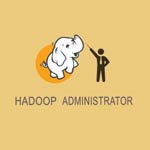Hadoop Administration

Hadoop Administration
Hadoop is an Apache open source framework carved in Java that allows distributed processing of large datasets across clusters of computers using simple programming models. This course teaches experienced peoples on purpose of Hadoop Technology, how to setup Hadoop Cluster, how to store Big Data using Hadoop (HDFS) and how to process/analyze the Big Data using MapReduce Programming or by using other Hadoop ecosystems

Course Summary
Hadoop is an Apache open source framework carved in Java that allows distributed processing of large datasets across clusters of computers using simple programming models. This course teaches experienced peoples on purpose of Hadoop Technology, how to setup Hadoop Cluster, how to store Big Data using Hadoop (HDFS) and how to process/analyze the Big Data using MapReduce Programming or by using other Hadoop ecosystems.
Using our course, you can learn and drive it with the Hadoop development. Using this course, you can get answers to fundamental questions such as: What is Hadoop? How do we tackle huge Data using HDFS, MapReduce? Why are we interested in it? How does it add value to businesses?
Course Highlights
The most common big data infrastructure uses a mixture of Hadoop and another database to run big data analytics. The course is prepared in such a way, it will be very effective and teaches with real time scenarios. The following were our course highlights:
- Introduction to Hadoop
- Introduction to Big Data
- The Hadoop Distributed File System (HDFS)
- MapReduce
- MapReduce Programming – Java Programming
- Advanced MapReduce Concepts
- Classic MapReduce and YARN
- Hadoop Streaming and Hadoop Pipes
- NOSQL
- HBase
- Hive
- Pig
- SQOOP
- H CATALOG
- FLUME
- Oozie
- SPARK
Prerequisites
- Basic Unix Commands
- Basic SQL Query Knowledge for Hive Queries
- Knowledge of an operating system like Linux is useful for the course
- Java is not strictly a prerequisite for working with Hadoop but knowledge of Core Java will help in learning MapReduce Programming easily
Why learn Hadoop Developer and Administrator?
Things keep changing and when in IT, you ought to realize that to manage the rules and to understand the new wave and ride it when it’s there. This course would bring down all the underlying battle that you may need to do to take to learn a complex technology and you’ll have the capacity to learn effectively through our course.
The most common tasks undertaken by Hadoop in the real world are:
- Processing business intelligence
- Improving operational performance
- Infrastructure management
- e-Commerce and Security and systems monitoring
- Customer relationship management (CRM)
- Database management
- Advertising, sales, and marketing endeavors
- Energy management
So, our course will be really helpful to your career as we will be covering the real-time scenarios within our course syllabus
Who can learn Hadoop Developer and Administrator?
Hadoop is rapidly turning into a must know technology for the following professionals
- Software Developers and Architects
- Business Intelligence Professionals
- Senior IT professionals
- Testing and Mainframe professionals
- Data Scientists
- Graduates looking to build a career in Hadoop & Big Data Analytics
- Analytics Professionals
- Data Management Professionals
- Project Managers
Advantages of Hadoop Admin
- Scalable: Hadoop being a highly scalable platform can store and distribute large data sets across several cost-effective servers that have the ability to operate in parallel. Traditional RDBMS don’t have this.
- Cost effective: Hadoop offers a highly cost-effective solution for enterprise data. Conventional RDBMS have a restrictive cost factor due to processing massive volumes of data.
- Flexible: Hadoop empowers businesses to instantly access new data sources and harness the various types of data. This is followed by value generation from gathered data.
- Speedy: Hadoop has a distinct storage method which is based on a distributed file system which is fundamental.
- Resilient to failure: Fault tolerance is one of the main advantages of Oracle DBA. It excels at data management and hence pros take it up regularly. When data is dispatched to an individual node it is also replicated to the other nodes in the said cluster. This means that in the event of failure there is another copy available for use. A key advantage of using Hadoop is its fault tolerance. When data is sent to an individual node, that data is also replicated to other nodes in the cluster, which means that in the event of failure, there is another copy available for use
Companies that use Hadoop
The following leading companies uses Hadoop to improve their business
- Amazon Web Services: Amazon Elastic MapReduce gives an oversaw, simple to utilize investigation stage worked around the effective Hadoop system.
- IBM: IBM InfoSphere Big Insights makes it less complex for individuals to utilize Hadoop and construct big data applications
- Cloudera: Cloudera creates open-source programming for the world reliant on Big Data. With Cloudera, organizations and different businesses can now interface with the world’s biggest informational collections at the speed of contemplations.
- MAPR Technologies: MapR’s advanced architecture brings exceptional trustworthiness, convenience and world-record speed to Hadoop, NoSQL, database and streaming applications in one brought together Big Data stage to support mission-basic and real-time production uses.
- Pivotal: Pivotal Introduces World’s Most Powerful Hadoop Distribution: Pivotal HD. Opens Hadoop as Key to Big Data’s Transformational Potential for Data-Driven Enterprises
Why Bumaco Global?
Learning Hadoop is simple, all you need is a little help in the correct course. You can learn it at home by setting a cluster on a single machine and attempt your hands on cutting-edge ideas at home and this course helps you do only that. In this course, you will take in the basics of Hadoop with cases and pictorial clarifications which are quick and straightforward. With exam like practice tests, you will prepare to clear Cloudera and Hortonworks developer certification examination.
There are courses from a considerable measure of organizations which cost a fortune ($2000 and upwards) for only 3 to 4-day training. This course is intended to give a less exorbitant DIY pattern learning. One of the kind characteristics of this course is it helps you achieve affirmation level ability at fraction of the cost.
What do we Provide?
- Comprehensive course materials to gain theoretical Knowledge
- Experienced faculties who are certified in the area of Big Data
- Quality study materials including assignments, assessments, case studies, and presentations
- Access to Hadoop Developer tools to perform analysis and reporting
- Become a certified expert with the concepts, techniques and its tools
- Be Hired faster, 65% of the Fortune 100 are using Big Data to drive their business
Cloudera Certified Administrator for Apache Hadoop
This certification is focused on IT professionals who are assigned tasks of configuring, deploying, securing and maintaining Apache Hadoop clusters for production and other business uses. The candidate will have to take up an exam to gain the certificate. The skills tested in the candidate in this exam are, resource management, installation and administration, and logging and monitoring for Hadoop. This CCAH credential will be valid for 2 years before renewal is needed.
It has to be noted that the CCAH exam was changed to CCA550 and again changed to CCA131, And CCA131 is the current name of this certification
CCA Administrator Exam (CCA131)
- Exam Questions: 8-12, which are hands-on or performance based tasks allotted on pre-configured Cloudera Enterprise cluster
- Exam Duration 120 mins
- Exam Pass Score – 70%
- Exam cost- $295
Exam Question Format
CCA questions need the candidate to resolve certain scenarios. While a few tasks require changes in configuration and service through the Cloudera Manager, the other tasks may call for knowledge of Linux environment and command line Hadoop utilities
Evaluation, Score Reporting, and Certificate
Each exam will be graded instantly upon submission and the score report is emailed the very same day as the exam. The score report not only includes scores per question, but also the criteria for which the questions you got wrong were graded on. The criteria may be reported as “Records contain incorrect data” or “Incorrect file format”
Passing the exam will entitle the candidate to a second mail providing a digital certificate with license number, Linkedin profile update and links to download CCA logos for personal use in social and business media.
Prerequisites
Taking the Cloudera certification exam does not require a stringent prerequisite, although a good background in system administration and or equal training will serve as an added plus
Differentiate capacity scheduler and Fair Scheduler
Fair Scheduler: A method in which jobs are assigned to each job getting an equal share of resources above time. The main advantage of this method is that all of the jobs, including short and long jobs, are given equal priority with short jobs completing faster.
Capacity Scheduler: A large cluster gets allowed and a capacity guarantee is given to each department. This lets the cluster get partitioned in many departments, each taking their own capacity and guarantee
What is Checkpointing and why is it important?
Checkpointing can be defined as a process in which a fs image and edit log files are taken and then attempts are made to shrink or compact them into a new fs image. This is important due to the fact that it leads to increased efficiency and reduction in the startup time related to the NameNode. Many-a-times, what happens is large edit logs lead to the jamming of the available disk capacity. So, it increases the NameNode startup time to a high extent. Usage of checkpointing helps in resolving this problem
Explain Namenode and Datanode
HDFS is known to follow the master/slave rule. The NameNode is contained by the HDFS cluster, acting as a master server. The duty of this server is to manage the namespace of the file system. The regulation of any access to the files by various clients is also one of its duties.
There is one DataNode per node in the cluster. Its duty is to handle the storage issues related to the nodes that they are in or that they are running in
Discuss on the Apache KAFKA Architecture
The architecture of Apache KAFKA is given as follows:
- The topic is termed as a flow of messages related to a single topic with the message termed as a burden of bytes.
- Someone who publishes messages related to a topic is termed as a publisher.
- The consumer can avail the subscription to any number of topics. The consumer can also track any of the published messages from the brokers by extracting data.
- Brokers are defined as the servers which store any of the published messages.
- This way, by using the serialization method, any method can be encoded by the producer
What are MapR features?
MapR features are given as under:
- They provide excellent recovery options and facilities. MapR snapshots store the snapshots of tables and files from time-to-time and this enables the recovery of data if it gets lost.
- It recovers every information and data tables in case of any disaster.
- Every cluster and data, interacting with it is encrypted, which provides wire-level security.
- It has direct access NFS, which enables NFS sharing capabilities and help in mounting it with some data source.
- I/O customized units, chunking, resync etc allows high-speed performance capabilities
What are the job titles available for Hadoop Administrator?
The job titles available for Hadoop Administrator are:
- Big Data Engineer
- Data Science tools and applications engineer
- Junior system administrator
- Technology support administrator
- IT Storage Administrator
- Senior System Administrator
- Hadoop System Administrator
- Data Management Analyst
- Database developer
- Business Service Administrator
What are the salary trends for Hadoop Administrator in the market?
The graph displayed below shows the salary trends for Hadoop Administrator in the market.
Thus, the salary taken by Hadoop professionals is $107,000 p.a. While salary taken by other professionals is less than $97000 p.a. So, we can infer that Hadoop, not only opens doors to many career options, it also provides a great in-hand salary for the professionals
What are the benefits of learning Hadoop?
The benefits of learning Hadoop are:
- The introduction of better career opportunities since the year 2015. The company looks forward to hiring those people who have prior experience in business intelligence, HBase, MongoDB and the like.
- The Big data market is rapidly growing. The growth is exponential, it has become a mandate to pace up with this market to meet better life-changing opportunities.
- The number of Hadoop jobs has also seen a rapid growth since the time Hadoop was introduced. So, the employment sector for Hadoop is also being good these days.
- Hadoop, by far, not only offers great career and employment opportunities, it also offers great salary packages. So, Hadoop certification also grants a great corporate life to the individuals.
- Many companies are demanding and hiring Hadoop and Big data professionals. These companies are very renowned and getting placed in them is indeed a great achievement
List the features of Hadoop
The features of Hadoop include:
- Bringing of flexibility in Data Processing. Unstructured data is actually meaningless data which have a hidden meaning in it. We need tools and technology to process this unstructured data and give it a structured form. For this, Hadoop has come out to be a great tool.
- Hadoop allows new nodes to be added and data volume to grow without altering any of the existing data. This means Hadoop has high scalability in it.
- In Hadoop’s HDFS, two copies of data get made in addition to the existing one. If a condition arises where the whole system collapses, the other two copies to make it possible to come back to the previous time and restore the whole data.
- Hadoop allows a lot faster processing of data. It does parallel processing and thus increases in speed is usually seen.
- Everything related to Hadoop and its ecosystem is robust in nature.
- Due to the parallel processing capabilities of Hadoop system, cost effectiveness is seen
Discuss the job responsibilities of Hadoop Administrator.
The job responsibilities of Hadoop Administrator are:
- To contour the flow of work/job
- Understanding what the Hadoop log files have to say and to handle them.
- Having every job fixed on the schedule and then do everything according to the schedule.
- Using Hive and Pig of any type of preprocessing.
- Not neglecting or overlooking data security at all and preserving them at every cost.
- There happens to be a vast amount of data on Hadoop. So, analyzing that data and take out meaningful observations from them.
- To develop and implement Hadoop
- To focus on speeding up the query mechanisms.
- To handle and use HBase.
- To research and dig out great practices
What are the Prerequisites for Hadoop Administrator Course?
- Basic Unix Commands
- Basic SQL Query Knowledge for Hive Queries
- Knowledge of an operating system like Linux is useful for the course
- Java is not strictly a prerequisite for working with Hadoop but knowledge of Core Java will help in learning MapReduce Programming easily
What are the system requirements to attend the live sessions?
- Processor I3 with 4GB RAM, OS can be 32 or 64 bit (Laptop/Desktop)
- Internet connection with Min 1 MBPS speed
- Good quality headset
- Power back up
- You can also log in through your Android mobile phone/ Tablet with 4G internet connectivity
What if the trainee miss any session?
The trainee can watch the recorded video of all the sessions in the LMS or Trainee can attend the missed session in the upcoming batches.
What do the trainee get from the LMS?
The trainee will have the access to Recorded sessions, Assignments, Quizzes, CasStudieses, few course documents posted by trainers, Placement related docs etc.
What is the validity of the LMS access? What if the LMS access is expired
The trainee will get 1-year access to the LMS. You can contact our support team to extend the validity of the LMS.
Will the trainee get any project to work on Hadoop Administrator course?
Yes, Of course! The trainee will get the project at the end of the course, you need to submit a project. Our trainers will assist you to complete the project.
How are the practicals done?
The trainee will get step by step assistance on VM installation from our expert trainers during the practical sessions, post live sessions, you can practice at your end and submit your queries if any to our support team support@corpconsult.co for further assistance.
What are the types of training we offer?
- WBLT- Web-based live Training
- WBVT- Web-based Video Training
- One on One live training
- Self-paced training
- In class training
What are the benefits of online training?
- Flexible location
- Flexible schedule
- Travel free
- Time saving
- Cost saving
- LMS access
- You will never miss a class
- Two-way interactive
- Fast learning
- Trainer support for 1 year
Who are our Trainers?
Our trainers are industry experts having 10 to 15 years of industry experience and 3-4 years of training experience. Most of the trainers are working professionals who teach the real time scenarios which will help the students to learn the courses in an effective manner.
Will the trainee get the certification post the course completion?
Yes, Trainee will get the participation certificate from Bumaco Global upon successfully completing the course.
What if the trainee has more queries and need assistance?
The trainee can drop an email to support@bumacoglobal.com an automatic ticket will get generated. Our support team works 24/7 to assist you with all your queries.
Designed & Developed by www.brandhype.in
Copyright © 2020 Bumaco Global. All rights reserved.


